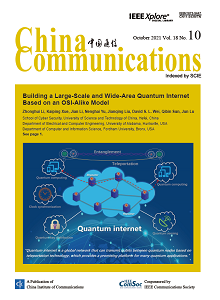在资源受限的物联网中部署高效的联合学习框架:用户选择和学习时间优化方案
IF 3.1
3区 计算机科学
Q2 TELECOMMUNICATIONS
引用次数: 0
摘要
本文研究了车联网(IoV)中的高效联合学习(FL)框架。在所考虑的模型中,车辆用户通过训练其本地 FL 模型实施 FL 算法,并将其模型发送到基站(BS),后者通过模型聚合生成全局 FL 模型。由于每个用户都拥有不同大小和质量的数据样本,因此基站有必要选择合适的参与用户,以获得更好的全局模型。同时,考虑到现有基于梯度的选择方法计算开销较大,提出了基于损耗衰减的轻量级用户选择方案。由于无线带宽有限,BS 需要选择合适的用户子集来实现 FL 算法。此外,在 IoV 中,当需要执行其他多个任务时,可用于 FL 训练的车辆用户计算资源通常是有限的。FL 的本地模型训练和模型参数传输将对 FL 的延迟产生重大影响。为解决这一问题,提出了通信和计算联合优化问题,其目标是在资源受限的系统中使 FL 延迟最小。为了解决这个复杂的非凸问题,提出了一种基于凹凸过程(CCCP)的算法,该算法可以在小规模和对延迟不敏感的 FL 系统中实现卓越的性能。由于 CCCP 方法在大规模 FL 系统中收敛速度太慢,因此该方法不适合对延迟敏感的应用。为了解决这个问题,我们提出了一种基于一步投影梯度法的块坐标下降算法,以降低求解的复杂度,但代价是轻度性能下降。仿真和数值结果表明了所提方法的良好性能。本文章由计算机程序翻译,如有差异,请以英文原文为准。
An efficient federated learning framework deployed in resource-constrained IoV: User selection and learning time optimization schemes
In this article, an efficient federated learning (FL) Framework in the Internet of Vehicles (IoV) is studied. In the considered model, vehicle users implement an FL algorithm by training their local FL models and sending their models to a base station (BS) that generates a global FL model through the model aggregation. Since each user owns data samples with diverse sizes and different quality, it is necessary for the BS to select the proper participating users to acquire a better global model. Meanwhile, considering the high computational overhead of existing selection methods based on the gradient, the lightweight user selection scheme based on the loss decay is proposed. Due to the limited wireless bandwidth, the BS needs to select an suitable subset of users to implement the FL algorithm. Moreover, the vehicle users' computing resource that can be used for FL training is usually limited in the IoV when other multiple tasks are required to be executed. The local model training and model parameter transmission of FL will have significant effects on the latency of FL. To address this issue, the joint communication and computing optimization problem is formulated whose objective is to minimize the FL delay in the resource-constrained system. To solve the complex nonconvex problem, an algorithm based on the concave-convex procedure (CCCP) is proposed, which can achieve superior performance in the small-scale and delay-insensitive FL system. Due to the fact that the convergence rate of CCCP method is too slow in a large-scale FL system, this method is not suitable for delay-sensitive applications. To solve this issue, a block coordinate descent algorithm based on the one-step projected gradient method is proposed to decrease the complexity of the solution at the cost of light performance degrading. Simulations are conducted and numerical results show the good performance of the proposed methods.
求助全文
通过发布文献求助,成功后即可免费获取论文全文。
去求助
来源期刊

China Communications
工程技术-电信学
CiteScore
8.00
自引率
12.20%
发文量
2868
审稿时长
8.6 months
期刊介绍:
China Communications (ISSN 1673-5447) is an English-language monthly journal cosponsored by the China Institute of Communications (CIC) and IEEE Communications Society (IEEE ComSoc). It is aimed at readers in industry, universities, research and development organizations, and government agencies in the field of Information and Communications Technologies (ICTs) worldwide.
The journal's main objective is to promote academic exchange in the ICTs sector and publish high-quality papers to contribute to the global ICTs industry. It provides instant access to the latest articles and papers, presenting leading-edge research achievements, tutorial overviews, and descriptions of significant practical applications of technology.
China Communications has been indexed in SCIE (Science Citation Index-Expanded) since January 2007. Additionally, all articles have been available in the IEEE Xplore digital library since January 2013.
 求助内容:
求助内容: 应助结果提醒方式:
应助结果提醒方式:


